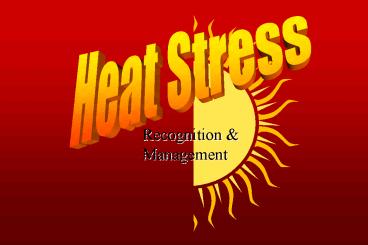Heat Stress - PowerPoint PPT Presentation
1 / 15
Title: Heat Stress
1
Heat Stress
Recognition Management
2
Heat stress is the buildup of body heat due to
exertion in warm or hot environments.Heat
exhaustion and heat stroke result when the body
is subjected to more heat than it can cope with.
Heat Stress
3
Heat Stress
- Heat stroke kills an average of 500
people/year in the U.S.. Heat related illnesses
affect many, many more. - Heat stress can lead to infertility in men,
cause heart attacks, falls, and equipment
accidents. - Heat stressed workers become weaker, less
alert, less able to use good judgement, and
therefore their job performance suffers.
4
Preventing Heat Illness
Protects health - Heat illness is
preventable. Improves safety Increases
productivity Is a requirement of the Worker
Protection Standard and employers are responsible.
5
Recognizing Heat Stress
Some symptoms are similar to OP
poisoning. Sweating, fatigue, headache, nausea,
loss of coordination, confusion Some symptoms
are different. Dry mouth, no tears or saliva,
fast pulse, dilated pupils
6
Key Elements
Water - Drink plenty of water. Minimum of 1/2
pint every 30 minutes. Start drinking before
working. Clothing - Wear loose, lightweight
clothing and a wide- brimmed hat. Acclimatization
- Gradually adjust to working in the heat. Rest
Breaks - Take periodic breaks in a shaded or air
conditioned area when possible. Monitoring
Workers - Employers should monitor workers when
they are working in the heat.
7
Heat Affects People Differently
People come in many shapes and sizes and with
different tolerances for heat. As a result, heat
affects different people in different ways some
people can work comfortably at higher
temperatures while others get sick from heat
stress.
8
Characteristics Leading to Heat Sensitivity
Very small body size. Poor nutrition Overweight Ov
er 40 years old (the older, the more
sensitive) Previous heat illness Heart
disease High blood pressure Diabetes Skin
disease Liver, kidney, and lung problems
9
Controlling Heat Stress
1. Train workers and supervisors in prevention,
recognition, and treatment of heat stress. 2.
Acclimatize workers when they begin work in
hot environments. Adjust gradually. 3. Take into
account weather, PPE, how strenuous the
activity is, and age or condition of worker. 4.
Manage work activities to avoid heat stress
(work during cooler parts of the day).
10
Controlling Heat Stress
5. Establish a drinking water program. 6-10
quarts per person per day. Start drinking
water before beginning work. 6. Take
additional measures as appropriate. Select
lightest weight or breathable PPE Provide
special cooling garments (vests,
headbands) Provide shade or air conditioning 7.
Give first aid when workers become ill.
11
First Aid for Heat Illness
Early heat illness - Loosen or remove
clothing, rest in shade for 30 min or more, and
drink water. Heat rash - clean skin, apply
cornstarch, wear loose clothing, see doctor if
rash persists. Heat cramps - Loosen clothing,
drink lightly salted beverages, massage, rest.
12
First Aid for Heat Illness
Heat Exhaustion - Move to cooler, shaded area
as quickly as possible. Rest lying down, drink
as much water as possible. Do not give salt.
Loosen or remove clothing, splash cold water on
body, and massage arms and legs. Treat for heat
stroke until proven otherwise.
Symptoms fatigue, headache, dizziness, loss of
coordination, profuse sweating, pale and cool
skin, dry mouth, dark yellow urine, fast pulse,
cramps, slurred speech, confusion, rapid
breathing, irritability.
13
Heat Stroke
Heat stroke is a life-threatening medical
emergency. It can occur suddenly and the symptoms
include headache, dizziness, confusion,
irrational or very aggressive behavior, rapid
breathing, fast pulse (if conscious),
convulsions, nausea, incoherent speech. Can
induce a coma in the affected person.
14
First Aid for Heat Stroke
Move to shaded area. Remove outer clothing and
immediately wrap in wet sheet, pour water on and
fan vigorously. After temp. is lowered treat for
shock, if present,. Prevent choking on vomit by
clearing mouth and nose. Transport to nearest
medical facility immediately. Continue cooling
procedures during transport. If conscious, have
person drink water. Do not give salt.
15
Remember
The Worker Protection Standard (WPS) and other
government regulations require agricultural
employers to take steps to avoid heat illness for
their employees.































